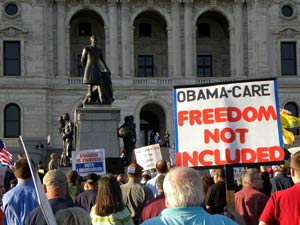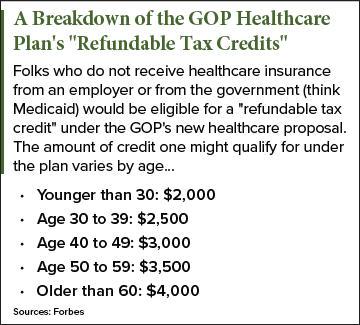 Why won't the GOP repeal Obamacare?
Why won't the GOP repeal Obamacare?
After all, it was their collective promise to do so that helped put our current class of congressional Republicans in office.
Many voters have become increasingly outraged over former President Barack Obama's misleading statements about the Affordable Care Act (ACA)...
"If you like the doctor you have, you can keep your doctor [under Obamacare]. And if you like your [health insurance] plans, you can keep those too," he claimed in a June 6, 2009, press conference. Since then, hundreds of thousands of people lost their doctors as major insurers quietly began offering "narrow networks" - or a limited number of doctors and hospitals people could see. Insurance companies did this - without notice - to save money.
And after ACA enrollment officially started in October 2013, 50%-75% of the 14 million Americans insured through an individual or work-sponsored healthcare market that year received notices that their healthcare plans were being cancelled. This happened because Obamacare instated benefit requirements like mental health and pre-existing condition coverage that many individual market insurers did not automatically provide. Those plans had to be cancelled, leaving the newly uninsured left to start all over again.
So on Nov. 8, 2016, Americans elected a Republican majority into government...
Why Won't the GOP Repeal Obamacare Instead of "Fixing It"?
There have been varied answers from Capitol Hill as to why GOP legislators chose to issue the ACA "replacement bill" - the American Health Care Act (AHCA) - on March 6 instead of going for a full overhaul of Obamacare.
On March 8, during a GOP congressional debate in the wake of the AHCA's reveal, House Ways and Means Committee Chairman Kevin Brady (R-TX) told his colleagues, "We have a choice. We can act now or we can keep fiddling around and squander this opportunity to repeal Obamacare."
Utah GOP Sen. Mike Lee also spoke up amid the discussion and said that the GOP healthcare proposal was not the plan he was hoping for. "This is instead a step in the wrong direction," Lee stated. "And as much as anything, it's a missed opportunity [to repeal the ACA]."
Then, on March 9, Sen. Rand Paul (R-KY) argued in a Hill op-ed that when it comes to actually repealing the ACA, it's pertinent to keep that promise made to voters now... before tackling replacement: "[After repeal] we can have a separate vote on replacement legislation that will deliver lower costs, better care, and greater access to the American," Paul wrote.
And just this past Monday, Sen. Steve Daines (R-MN) aired criticisms of the House Republicans' Obamacare replacement law and its version of a "repeal and replace."
"We need to do better," he said in a statement to The Missoulian. "I want to see costs and premiums go down to make healthcare more affordable for Montana families."
To Daines' point, the AHCA indeed included some serious problems of its own.
Want to make money? Here's how to make over $100,000 starting with a small amount of money... rolling stocks over and over again. Click here for this proven investing method...
In fact, we've identified two of potentially disastrous portions of the AHCA...
[mmpazkzone name="in-story" network="9794" site="307044" id="137008" type="4"]
First, Republicans nixed the ACA's contentious "individual mandate" from their new plan - an original statute that penalizes individuals for not carrying health insurance coverage. But the mandate's GOP replacement is literally just a change of words...
You see, while the term "individual mandate" doesn't appear in the GOP's new healthcare bill, there is still a non-coverage penalty within the new plan's statutes called the "continuous-coverage incentive."
This "incentive" is actually a penalty in the form of a one-time, 12-month, 30% "surcharge" paid to healthcare insurers by anyone who goes without insurance for 63 days (this precise number has not been fully explained by the AHCA's writers).
"The continuous coverage incentive is designed to limit adverse selection in healthcare markets," the House summary stated on March 7. This means that anyone who goes without health coverage for any reason has to pay "a flat 30% late-enrollment surcharge on top of their base premium" for the next year, according to the summary.
But The Atlantic noted on March 8 that "[paying this incentive surcharge] is like once you've decided to park illegally and know you're going to get a ticket, you might as well stay a while."
Don't Miss: The Secret That Can Turn $2,500 into $1 Million or More
And it doesn't really offer a solution to the healthcare coverage (or lack thereof) problem facing Americans today; it just penalizes them for not having coverage before letting them go on their merry ways.
Second, there's the age-old controversy surrounding health insurance premiums...
Under the ACA, the U.S. government provides subsidies for qualified enrollees to help cover the cost of their monthly healthcare premiums. These subsidies vary depending on a person's income and location, with poorer individuals getting more help and richer people less help, while offering additional subsidies for enrollees who live in areas where healthcare is expensive.
Under the GOP's new plan, everyone earning less than $75,000 per year would receive a set amount to put toward healthcare coverage based on age. These subsidies would come in the form of "refundable tax credits."
Here's a little breakdown on how they would work:

The problem with the GOP's "refundable tax credit" proposal - particularly with its age-related basis - is that folks earning $20,000 a year will take a huge hit at any age under the plan, a recent Kaiser Permanente study found, also released on March 7.
The KP report gave an example of the age-related basis problem: "A 27-year-old would get only $2,000, instead of $3,225 under Obamacare, on average, while a 40-year-old would get $3,000 versus nearly $4,150 [per year]."
The report then went on to highlight an even bigger loser under the GOP's new plan: "The 60-year-old who would receive only $4,000 in credits per year, instead of nearly $9,900 under Obamacare."
This is not an appropriate "fix" considering the elderly population has already taken a huge healthcare hit under the ACA.
After all, Obamacare wound up burdening America's oldest population with fewer Medicare Advantage (MA) plan options, higher "Part D" premiums, and access to fewer physicians, according to an August 2013 report from the Heritage Foundation.
Who's Worse Off? Baby boomers and millennials both face daunting retirement problems right now. Social Security is failing, the Great Recession eviscerated trillions, the age at which you can afford to retire keeps getting pushed further and further. And millennials are the first generation in U.S. history to enter adulthood in worse economic shape than their parents...
Follow Money Morning on Facebook and Twitter.
Related Articles:
- Kaiser Permanente: Tax Credits Under the Affordable Care Act vs. the American Health Care Act: An Interactive Map
- Forbes: Fix the Tax Code Friday: Refundable Tax Credits Under the GOP Health Care Plan
- The Hill: Rand Paul Introduces Obamacare Repeal Alternative
- Money Morning: How to Profit When the Markets Try a Fake-Out


